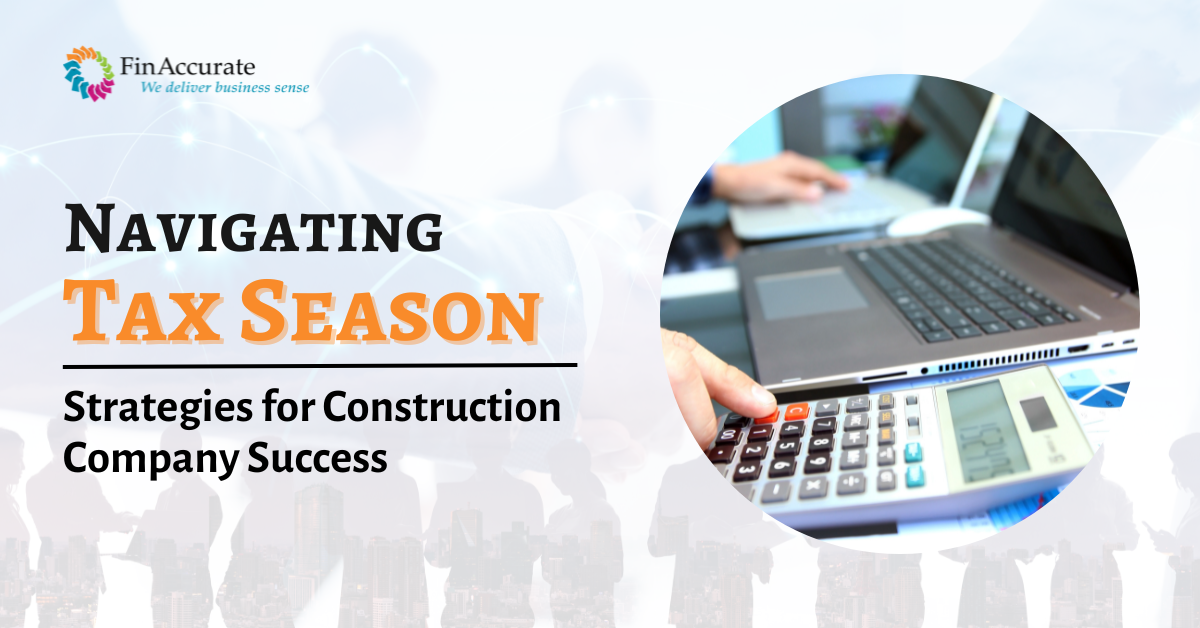Welcome to our blog on mastering tax season for construction companies. Tax time can be both challenging and crucial for your company’s financial success. In this blog, we will explore essential strategies tailored to help construction companies thrive during tax season. From maximizing deductions to leveraging tax incentives, we’ve got you covered. Let’s dive in and unlock the secrets to success during tax season for your construction business.
Use this tax preparation list as a starting point all year long to help your construction contractor business grow and stay in business for the long run. Contractors need to take a complete approach to tax planning and make preparation a priority all year long to get the most out of tax time. Strategic tax planning takes into account more than just delaying income and speeding up expenses. It also takes into account the effect on financial statements, cash flow, capitalization, and meeting the goals of lenders and customers. To keep a business growing, it’s important to talk to trusted experts on a regular basis, whether they work for accounting firms or not. Tax time is just one part of a complete plan for running a business. Here are some long-term growth and sustainability strategies that can be used all year long.
Choose a Knowledgeable Advisor
A tax advisor who knows your business and has a deep understanding of local and state tax rules, credits, and rulings will save you time, stress, and money. A large number of similar-sized clients can show that a construction-focused accounting business has a lot of experience and strength in the field. Don’t be afraid to “interview” the company you might hire. Find out who will be on your team by asking about relevant criteria and information about their team’s expertise in your field.
- Does the company have any Certified Construction Industry Financial Professionals (CCIFPs) who are also CPAs?
- Have they taken on new clients in construction and told those new clients about changes to the way taxes are reported?
- Ask for references and find out why people have stuck with you and what you’ve taught them.
Your tax expert is a part of your team, so you need to make sure you choose the right one.
Find the Right Way to Keep Track of Money
Even though tax season is in full swing this year, concrete and construction companies can still do things to gain from it. Contractors should make sure that the way they report taxes for each contract is correct by figuring out which jobs are long-term (last more than a year) and which aren’t. The percentage-of-completion method (PCM) is used by most companies for long-term jobs. But there are many cases. For example, maximum domestic developers can use an exclusive manner to file their taxes. A home builder is not the only thing that makes someone a house contractor.
Also, the Tax Cuts &Jobs Act of 2017 (TCJA) makes it possible for contractors with average annual gross sales of up to $26 million (adjusted for inflation) to use tax accounting methods that were previously only open to smaller contractors. A tool that is often overlooked is choosing the right method for each contract to lower tax costs. Each contract could have a different way of reporting for income tax reasons.
Check if Your Company Qualifies for an R&D Tax Credit
Contractors may be eligible for a research and development (R&D) tax credit if they come up with new ways to improve efficiency or lower or get rid of uncertainty in the U.S. Most of the time, an R&D tax credit is taken on the whole eligible project or on the part that meets the IRS’s requirements. If not all of the R&D tax credit is used, it can be pushed back to the year before and forward for 20 years. The R&D tax credit can also be used to pay payroll taxes for qualified start-ups and small companies that may not have to pay income tax.
Take the Energy-Efficient Buildings Discount
The Energy-Efficient Building Deduction (Section 179D) was made permanent by the Consolidated Appropriations Act (CAA) of 2021. Improvements to commercial and government buildings that save energy can be deducted by business owners and government workers. New or existing building owners who add interior lighting, building envelope, heating, cooling, ventilation, or hot water systems that cut energy and power costs by 50% or more can get a tax deduction of $1.80 per square foot.
Any tax benefits from these buildings can be carried back two tax years or forward for up to 20 years. Under a special rule for public land, 179D can also be used by architects, engineers, contractors, environmental consultants, and energy service providers who are eligible.
Monitor Agreement Provisions
It is important to know that the terms of a contract could change the way taxes need to be reported. For instance, a contract with a unit price or a GMP (Gross Maximum Price) has a different tax provision than a contract with a lump sum. When it comes to taxes, there are different ways to report contracts that say pay if paid or pay when paid. The retainage clause also has an effect on how taxes are reported. So, it’s very important that workers really understand that the terms of their contracts could give them tax breaks or make taxes harder for them.
Use Extra Depreciation Changes to Your Benefit
The Coronavirus Aid, Relief, and Economic Security (CARES) Act makes a technical change to the Tax Cuts and Jobs Act (TCJA) that lets qualified Qualified Improvement Property (QIP) put into service between December 31, 2017, and January 1, 2023, get 100% bonus depreciation. So, taxpayers who put in service-qualified QIP between 2018 and 2022 may be able to claim 100% bonus depreciation. But for 2023, you can only deduct 80% of the cost of the land. REITs, manufacturers, and other businesses that own certain nonresidential improvements on leased land may also be qualified. This can help companies, especially those in the retail, restaurant, and hospitality industries, improve their cash flow.
Real Estate Professional Eligibility
Most rental income and activities are considered passive income unless the investor meets the tax requirements to be called a real estate professional. After that, it isn’t considered idle income anymore. Losses can be deducted if the real estate agent is involved in the rental business in a significant way. At least 750 hours and more than half of the person’s time must be spent on real estate tasks. You don’t need a license to buy or sell real estate, but there are other rules to follow. The Internal Revenue Code, on the other hand, says that this rule usually applies to contractors. It’s important to look into this chance because it can be a valuable tool for tax planning.
State Services and Tax Credits
Working with a consultant who knows the business will help you make the most of not only the federal credits you can get but also the state credits and programs you can get. For example, many states are putting a lot of attention on environmental problems and credits and incentives for green energy. These things have a big effect on the building business. For example, New Jersey just set up a credit for companies that make concrete that meets certain low-carbon guidelines. This is simply one kingdom and one software like this, however, there are lots more, and maximum states have packages to assist with growth.
Taking a smart, all-around approach to tax planning can help your business in the long run in many ways. A business advisor who knows your industry well will be able to give you advice on the cost-benefit of each of the above tactics. Also, once you’ve found a trusted guide, you can make a growth plan for your business that will help it succeed for years to come.
How to Run a Successful Construction Company?
In the building business, there is a lot at stake. Putting up homes and buildings costs a lot of money, and safety is the most important thing. Customers are usually careful and very involved in the building process, which can be hard for construction companies.
To be successful and keep customers coming back, owners of construction companies must pay attention to customer service, quality, prices, and many other things. We’ll look at seven ways to build a great construction business and talk about the tools you need to run it every day.
- Make customer service the most important part of your building business.
- Find your place in the building business.
- Advertise your building business.
- Protect your building business by getting it insured.
- Keep working on your building business.
- Don’t take shortcuts in your building business.
- Keep your building business in order.
Conclusion:
In conclusion, mastering tax season is vital for a construction company’s success. By taking a holistic approach to tax planning and investing in year-round preparation, contractors can optimize their financial outcomes. Strategic tax planning considers factors beyond income deferral and expense acceleration, such as financial statements, cash position, and meeting lender and customer expectations. Regular discussions with trusted advisors ensure sustained business growth. Remember, tax season is just one piece of the puzzle in achieving overall success in the construction industry. By implementing the strategies discussed in this blog, you can confidently navigate tax season and position your construction company for long-term prosperity.
Visit our website at Finaccurate for expert guidance and specialized services in tax planning for the construction industry. Our team of professionals is dedicated to helping you navigate the complexities of tax season and optimize your financial outcomes. Don’t miss out on valuable insights and resources. Take action now and unlock the full potential of your construction business!
Frequently Asking Questions
- What are the taxes applicable to construction industries?
Ans: The taxes applicable to the construction industry can vary depending on the specific location and jurisdiction. In general, 18% of the GST is added to construction services. This rate is different in the construction industry, where it is 1% for affordable homes. Also, the rate for input service and construction materials is 18%, while the rate for other categories is 5%. When ITC incidence is taken into account, the GST rate on building services is between 8% and 10%.
- How can I save on tax in construction?
Ans: To save on taxes in the US construction industry:
- Maximize deductions for business expenses.
- Utilize bonus depreciation and Section 179.
- Explore R&D tax credits for innovative projects.
- Optimize business entity structure.
- Plan for estimated tax payments.
- Stay informed of tax law changes.
- Consult a tax professional for personalized advice.
What is the income tax rate for a construction company?
Ans: After taking into account the advantageous effects of indexation, the rate of taxation on long-term capital gains is 20%. From Section 80C up to and including Section 80U, there is no deduction that can be taken from long-term capital gains.
- What are the tax reduction strategies?
Ans: A few strategies can be used to lower your taxable income. These include making contributions to a 401(k) or other employee benefit plan, to a health savings account (HSA), a flexible spending account (FSA), or to a traditional IRA.
Editor’s Choices:
Simplifying Square 1099 Tax Form: Everything You Need to Know








